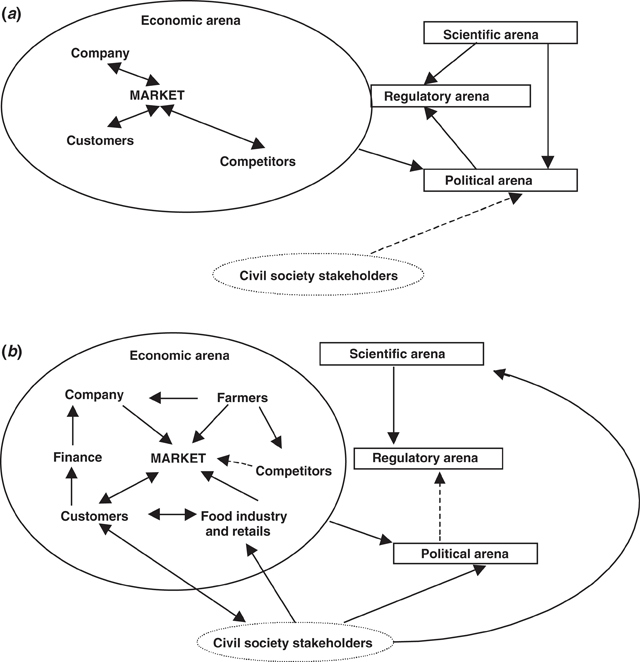Resilient farming systems in a complex world — new issues for the governance of science and innovation
P-B. JolyINRA-TSV (Transformations Sociales et Politiques liées au Vivant), 65, boulevard de Brandebourg, 94205 Ivry-sur-Seine cedex, France. Email: joly@ivry.inra.fr
Australian Journal of Experimental Agriculture 45(6) 617-626 https://doi.org/10.1071/EA03252
Submitted: 22 November 2003 Accepted: 2 June 2004 Published: 29 June 2005
Abstract
The question of the resilience of farming system approaches and farming systems resulting from current changes in the agricultural sector has lead to the identification of 3 key challenges. These are (i) increasing competition, (ii) privatisation of agricultural research, and (iii) the transition towards a ‘risk society’. The way farming system approaches may turn these challenges into opportunities implies a major change: it is not enough to act locally and think globally. It is necessary to integrate various scales of analysis and various levels of action, and it is no longer enough to only act in the farming systems arena. One must also be heard in the policy making spheres and be active in the policy making processes. Although they require major adaptations, such changes appear to be consistent with the past trajectory of farming system approaches.
Acknowledgments
This paper was presented as a theme keynote at the first Australian Farming Systems Conference, Toowoomba, Queensland, 7–11 September 2003. Many thanks to Anne Crawford and Mark Paine for this invitation, which created the opportunity for extensive exchanges and to the Australian Dairy Industry for having made this possible. Thanks to Marc Barbier and Claire Marris for careful reading and thoughtful comments. I am also grateful to the 2 anonymous referees for their comments.
Callon M,
Eymard-Duvernay F,
Gadrey J,
Karpik L,
Musselin C, Paradeise C
(2002) La qualité–Dossier débat. Sociologie du Travail 44, 256–288.
| Crossref |

d’Arcimoles M, Borraz O
(2003) Réguler ou qualifier? Le cas des boues d'épuration urbaines. Sociologie du Travail 45, 45–62.
| Crossref | GoogleScholarGoogle Scholar |

Graff G, Zilberman D
(2001) An intellectual property clearinghouse for agricultural biotechnology. Nature Biotechnology 19, 1179–1180.
| Crossref |
PubMed |

Joly PB
(2001) Les OGM entre la science et le public? Quatre modèles pour la gouvernance de l’innovation et des risques. Economie Rurale 266, 11–29.
| Crossref |

Joly PB, Hervieu B
(2003) La marchandisation du vivant: pour une mutualisation des recherches en génomique. Futuribles 292, 5–29.
| Crossref |

Joly PB, Mangematin V
(1996) Profile of public laboratories, industrial partners and the organisation of R&D. Research Policy 25, 901–922.
| Crossref | GoogleScholarGoogle Scholar |

Levidow L,
Oreszczyn S,
Assouline G, Joly PB
(2002) Industry responses to the European controversy over agricultural biotechnology. Science and Public Policy 29, 267–276.
| Crossref |

Paradeise C
(2003) French sociology of work and labor: from shop floor to labor markets to networked careers. Organization Studies 24, 633–653.
| Crossref | GoogleScholarGoogle Scholar |

Stone GD
(2002) Both sides now: fallacies in the GM wars, implications for developing countries, and anthropological perspectives. Current Anthropology 43, 611–630.
| Crossref | GoogleScholarGoogle Scholar |

Appendix 1. Risk society and the rise of civil society stakeholders (Levidow et al. 2002)
In the European controversy on GMP, Industry has difficulty in accommodating drastic changes in interactions between policy making, industry and civil society. Previously the agri-biotechnology industry had operated within a bi-polar model, whereby industry simply lobbies government for favourable policies. In this model, civil society stakeholders are few, are mainly environmental organisations, and have a weak presence in the dynamic. Policy making is based on the triangular close relations between the scientific, regulatory and political arenas, which in turn facilitate markets in the economic arena (see Fig. 1a). Companies that led the rapid development and commercial use of first-generation GM crops, supported by governments, counted on such channels in order to establish a favourable socio-economic environment.

|
Until the late 1990s, companies interpreted various signals according to that model. They assumed that eventually their vision, well supported by USA government and key international institutions, would be adopted as the international standard. As the former CEO of Monsanto publicly acknowledged, the company was unable to hear the concerns of the civil society. It led industry-lobbying efforts against GM labelling and against the precautionary principle.
Anti-biotechnology protests undermined that model and led to the second model, in which civil society stakeholders influence all arenas (see Fig. 1b). Through new relationships between consumers and environmental movements at the international level, civil society stakeholders (public interest groups) put pressure on a broad range of actors. By default of any means to act as citizens, people ‘voted’ as consumers against GM food: forces of civil society blocked GM products in the economic arena. Meanwhile the political arena was paralysed by disputes over pro-biotechnology bias in official expertise and over divergent visions of sustainable agriculture.
Consequently, influential financial analysts advised shareholders to sell stocks of some companies dedicated to agricultural biotechnology. These pressures undermined the ‘life sciences’ concept, which formerly guided the joint development of agrochemical and pharmaceutical divisions of multinational corporations. Many companies have split their agricultural activities from more profitable human-health activities.
Europe-based companies perceived these changes much earlier than USA-based ones such as Monsanto. Since 1999, most companies have understood the need to accommodate civil society, while fearing that the European controversy will spread to North America. This prospect was articulated by USA Secretary of Agriculture, Dan Glickman, in July 1999: although distrust of GM crops is scientifically unfounded, he warned, ‘it is nothing if it's not accepted’ by consumers. To anticipate future developments, some companies established high-level strategic committees devoted to analysing socio-political systems.


